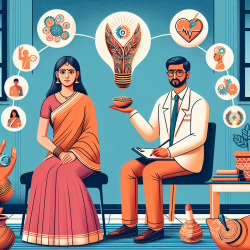The intersection of domestic violence (DV) and reproductive health is a critical area that requires urgent attention, especially in regions like India where maternal and child mortality rates are high. A recent systematic review titled "Integrated domestic violence and reproductive health interventions in India: a systematic review" sheds light on effective strategies that can be implemented to address this issue.
Understanding the Problem
Domestic violence is a pervasive issue that significantly impacts women's health during pregnancy and the postpartum period. In India, DV is alarmingly prevalent, with rates ranging from 32% to 77.5% as reported in various studies. The consequences of DV during pregnancy include adverse health outcomes such as low birth weight, preterm labor, and even maternal mortality.
The Need for Integrated Interventions
The systematic review highlights the importance of integrating DV interventions within reproductive healthcare settings. Such integration not only addresses the immediate safety concerns of women but also promotes long-term health benefits by ensuring access to comprehensive care. The review identified several key components of effective interventions:
- Psychoeducation/Education: Educating women about DV and its impact on health is crucial. This includes raising awareness about gender inequitable norms and promoting safety measures.
- Skill Building: Developing skills in areas such as communication, problem-solving, and conflict resolution can empower women to navigate challenging situations more effectively.
- Counseling: Providing emotional support and crisis intervention through counseling helps women cope with the psychological impact of DV.
- Engaging Male Spouses: Involving male partners in the intervention process can lead to more equitable relationships and reduce incidents of violence.
Promising Interventions
The review discusses several promising interventions that have shown positive outcomes in reducing DV when integrated with reproductive health services:
- CHARM Intervention: This intervention involves counseling men on gender equity and family planning. It has been effective in increasing contraceptive use and reducing incidents of sexual IPV.
- SNEHA Model: Community resource centers provide integrated services including DV counseling and support programs for women. Although not statistically significant, the model showed promising results in reducing IPV.
- Community Mobilization: Participatory learning and action groups facilitated by Accredited Social Health Activists (ASHAs) have been successful in reducing emotional violence from husbands and family members.
The Role of Healthcare Providers
Healthcare providers play a pivotal role in identifying and supporting DV survivors. Training providers to screen for DV during routine reproductive health check-ups can lead to timely interventions. The World Health Organization recommends screening all pregnant women for DV as part of antenatal care.
The Path Forward
While progress has been made, there is still much work to be done. Future research should focus on evaluating the cost-effectiveness and scalability of these interventions across different regions in India. Additionally, policies that mandate universal screening for DV in healthcare settings are essential to ensure comprehensive care for all women.
For practitioners looking to improve their skills or contribute to this field, engaging with ongoing research and participating in training programs on integrated DV-reproductive health interventions can be highly beneficial.
To read the original research paper, please follow this link: Integrated domestic violence and reproductive health interventions in India: a systematic review.










